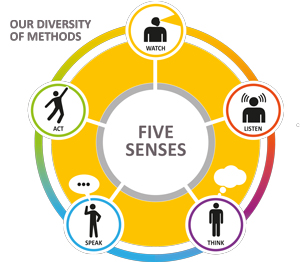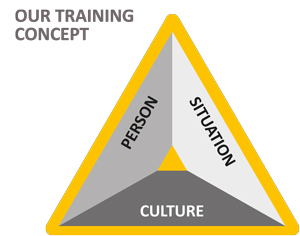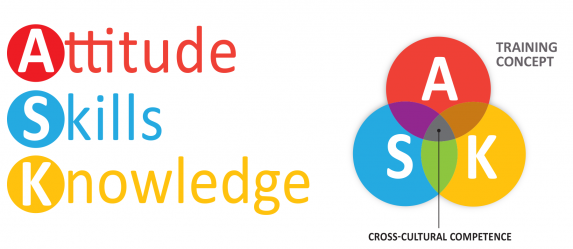Above all, successful communication depends on the interpersonal relationship. Not only in the day-to-day business, but also in our trainings. Our approach creates cross-cultural competence by combining and coordinating different approaches and perspectives in our training offers.
In every training offer, we apply our concepts of the five senses, the ASK and the systemic triangle. This sustainable and holistic approach starts right where you are at, at the moment, and takes you where you want to go.

Our Training Concepts
The Five Senses
Our methods are interactive and appeal to all five senses to ensure a sustainable learning experience.
Each training combines:
- Individually tailored simulations, exercises, discussions and Q & A's
- Selected, country-specific case studies
- Short theoretical inputs and impulse lectures
- Multimedia (music, video, images, PowerPoint presentation)
- Illustrative material and accessories (country-specific goods, souvenirs, snacks)
This ensures a high level of know-how transfer and guarantees the active participation of the participants.

Das Systemische Dreieck

ASK

The Systemic Triangle
We approach cross-cultural communication systemically and holistically:
- Culture: As culture often has the leading role, we reflect cultural imprints that are consciously or unconsciously present.
- Person: Sometimes, however, the personality of the affected persons explains more than the cultural imprint. Here, we reflect individual expectations, perceptions and attributions.
- Situation: Cultural behavior always depends on the situation. Processes and structures of a company organization, power relations, place and time of an encounter influence behavior and possibilities.
ASK
Cross-cultural competence is the result of various factors. Our participants are taught or trained in:
- Attitude: The right attitude towards people from a different culture is the prerequisite for successful cooperation.
- Skills: The participants acquire these through appropriate exercises in communication, behavior and interaction.
- Knowledge: Knowledge of the host culture is crucial. This, in turn, has a positive effect on the attitudes of the participants.

